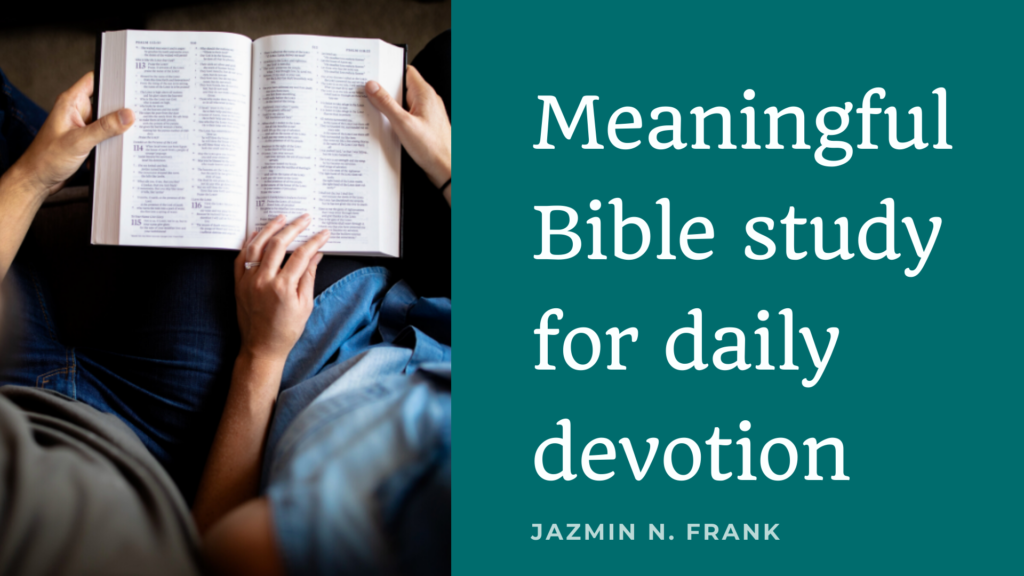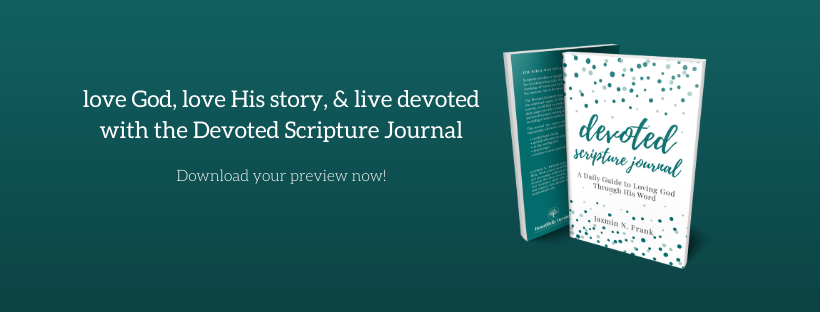It’s hard for me to do a task if I don’t see a purpose behind it, if I don’t find it meaningful and helpful in some way. I’m a rule follower, and sometimes that means I do something because I know logically it’s the right thing to do. But even then, some of those “right things” can become burdens. They can amp up my anxiety or even make me angry.
Unfortunately that same attitude comes into my Bible study time.
Logically, I know studying the Bible is important. It’s one of the main tangible ways we connect with God. But if I come at Bible study as a task instead of a relationship builder, I can sometimes find myself resenting the discipline.
That’s how this whole idea of Devoted came about. I was actively searching for ways to eliminate the pressure of my time in Scripture and make it meaningful. The solution I’ve found to correcting this mindset is to view Bible study as a way to build relationship with God, rather than a task good Christians should complete.
What is meaningful Bible study?
To make Bible study meaningful you have to engage your full self in the practice. This is not something you do with just your mind or just your emotions. Meaningful Bible study is a holistic practice.
Remember what Jesus said when asked what the greatest commandment was?
“You shall love the Lord your God with all your heart and with all your soul and with all your mind.” (Matthew 22:37, ESV)
Loving God means building relationship with Him, and building relationship requires putting our full selves into it.
There are several practices, called spiritual disciplines, that give us tangible ways to build relationship with God, but reading and studying the Bible is one of the simplest. All that is involved is opening your Bible and spending some time in those words.
The problem comes when the reading plans and daily practice of reading overwhelms us because it just feels like too much, or underwhelms us because we just aren’t engaged in God’s Word. When that happens, we have to take steps to make Bible study meaningful again–to let this practice of studying the Bible be a way for us to connect with God.
How do I make Bible study meaningful?
Making Bible study meaningful begins with developing the right mindset. If you’ve been approaching Bible study as a task that needs completed, the first step is to reorient yourself to use the practice as a way to be in relationship with God–to hear from Him, respond to Him, and encounter His heart.
Cultivate a devoted mindset
Cultivating a new mindset takes time and intentionality, but that’s why I created the Devoted Scripture Journal. This journal pairs intentional Bible study with regular heart checks to restore the relational aspect of Bible study. The goal of this journal is to give you a framework for studying the Bible and prompts to help you connect with God at a heart level–to notice where He’s at work in your life, to be open and honest about what’s going on inside you, and to meet God in His Word.
I spend one whole session in my Meaningful Bible Study Workshop walking through the daily pages of this journal and explaining how to use it as a relationship builder. You can also get a preview of the journal if you’d like to check it out.
Activate your Bible study skills
Another way to make Bible study meaningful is by using Bible study skills to actively read Scripture. There have been times in my Bible reading where I’m reading the words, but not comprehending or engaging. I’m passive, most of the time only focused on checking of the box on my reading plan.
When I go into my Bible reading with my pen ready, my journal handy, and mind engaged in conversation with God about His Word, the experience is drastically different. It doesn’t feel like a burden; rather, Bible study becomes conversation. Bible study skills are as simple as marking in your Bible, asking questions, or recording what you discover in your journal.
Want to learn more about developing your Bible study skills? I walk through 3 simple ways to make Bible study meaningful in my workshop. Or pick up one of my Bible studies. Each study has a section before we dive into daily study that highlights a few Bible study skills that you then get to use through the rest of that study.
Study in community
One often overlooked way to make Bible study meaningful is to not do it alone. There is definitely an independent piece of Bible study that we need to invest our time into. We need to spend time engaging with God through His Word by ourselves. However, the Bible is also meant to be a community thing.
Gathering as a small group, in a Sunday School class, or with a friend at a coffee shop adds depth to Bible study. When you’re accountable to someone else, you’re more likely to actively engage in your reading. Studying the Bible with other people also means you get to approach the Bible from different angles because each person brings their own experiences, understanding, and education to the study.
The Devoted Scripture Journal is a great resource to use as a group. Everyone can spend time studying Scripture on their own through the week and then gather together to crack open their journals and share what they learned.
Making Bible study meaningful is not a complicated thing. It’s time to let go of the pressure studying the Bible can cause and simply press into the truth that Bible study is a way to build relationship with God. Bible study is meaningful when we’re intentional about pursuing that relationship, when we actively engage our Bible study skills, and when we study in community.
Want to learn more about how to make Bible study meaningful? Check out my free 4 day Meaningful Bible Study Workshop and get a companion workbook to practice what you learn!

Related: How to Put the Most into Your Devoted Time
Live in His love!




